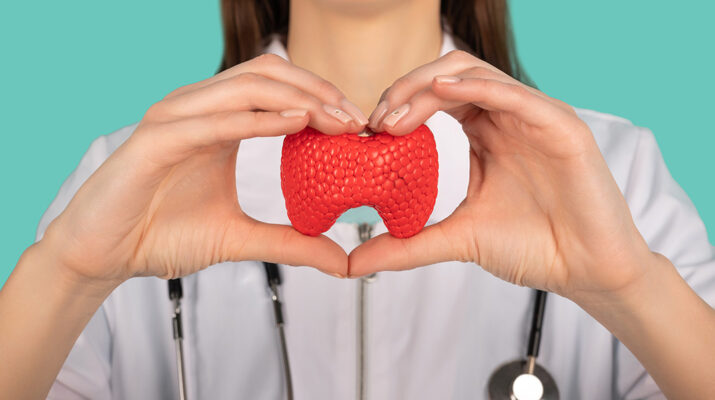Women are nine times more likely to have a thyroid disorder
By Deborah Jeanne Sergeant
Thyroid disorders are important to treat as this small gland at the base of the neck below the Adam’s apple controls numerous bodily functions.
Without its proper function, people can become more likely to experience potentially deadly blood clots, stroke, heart failure and other heart issues.
In addition to regulating aspects of the autonomic nervous system for either gender, the thyroid also affects women regarding menstruation, ovulation, cyst development, pregnancy and postpartum complications and early onset menopause. In hyperthyroidism, the thyroid makes too much thyroid hormone; in hypothyroidism, the thyroid makes too little.
Since it increases the body’s metabolism, hyperthyroidism typically causes weight loss, hand tremors and rapid or irregular heartbeat. Those with hypothyroidism may notice fatigue, feeling cold, constipation, dry skin, weight gain, puffiness in the face, hoarseness, coarse and thinning hair, muscle weakness, muscle aches, muscle stiffness, irregular or heavier menstrual cycles, slower heart rate, depression and memory problems.
Because many of these symptoms can be attributed to many other causes, Az Tahir, physician, practicing in functional medicine in Syracuse at High Point Wellness and in Henrietta, advises people experiencing these symptoms to seek a blood test.
“Most doctors are not attentive to these issues,” Tahir said. “The main problem in modern medicine is because a doctor isn’t thinking about the thyroid, when a patient says, ‘I’m tired, I have constipation, my periods are irregular and my skin is dry,’ they will give other tests and not test the thyroid.”
About 12% of US adults will develop a thyroid disorder during their lifetime and about 20 million currently have a thyroid disorder, according to www.thyroid.org. Women are nine times more likely to have a thyroid disorder, likely because Hashimoto’s syndrome, a precursor of hypothyroidism, is more common in women. It’s an autoimmune disorder, a category of diseases to which women are more prone than men.
Tahir said that even among physicians who test the thyroid for their patients, they tend to overlook the need for treating them for thyroid issues if their test results are borderline, even if they experience classic hypo- or hyperthyroid symptoms. The test measures thyroid stimulating hormone (TSH) in the blood stream.
“They’ll say your TSH is normal, but it’s not actually normal,” Tahir said. “They won’t listen to the patient and that’s the basic principle of medicine. Hippocrates said to listen to the patient and the patient will tell you the diagnosis.”
He uses a compounding pharmacy as needed to ensure he can make available to patients the formula that best meets their needs.
Tahir also thinks that although medication is necessary, physicians tend to fixate on medication only without giving enough merit to overall lifestyle. In addition to medication to help control the problem, Tahir recommends improving diet.
“A number of studies link Hashimoto’s with leaky gut,” Tahir said. “I make sure the gut is strong.”
He recommends bone broth for chicken soup to improve gut health, along with foods such as yogurt, kefir and kimchi. Enough water and fiber are also necessary. Tahir said that clear urine that’s not odorous indicates sufficient hydration. If there’s a problem with your gut, then you can look into treatments like gut health treatments in Charleston, SC.
Foods that can support thyroid health includes Brazil nuts; turmeric; garlic, ginger; mushrooms; berries; fish such as yellowfin tuna, halibut, sardines and salmon; meat like ham, pork, beef, and turkey; poultry; eggs and breads and grains, especially those enriched with selenium.
“I advise patients to try to not eat out; cook at home, especially when they’re sick,” Tahir added. “They know the ingredients and eat the least ingredients.”
He also promotes tea made with turmeric, ginger, milk thistle, dandelion root, echinacea or rosemary.
Ajay Chaudhuri, physician, division chief endocrinology, diabetes and metabolism at UBMD Internal Medicine and Jacobs School of Medicine and Biomedical Sciences, University at Buffalo advises diagnosed thyroid disorder patients to eat a healthful diet and to exercise to support overall good health.
Beyond prescribed medication, “there’s no real evidence out there if there are other things that can help,” he added. “Selenium, a trace element, has been shown to have some effect but there’s no scientific evidence. People often ask if they can change their diet to correct it.”
Chaudhuri warns women planning to get pregnant to have their thyroid level checked first and also early in the pregnancy because babies rely upon the mother’s level of thyroid early in the pregnancy.
“It may not be causing any symptoms, but you don’t want an underactive thyroid while pregnant,” he said.
He also tells patients about to test for thyroid and those who have been diagnosed that they should tell their provider about any other medication and supplements they take, as these can affect the efficacy of their thyroid medicine.

